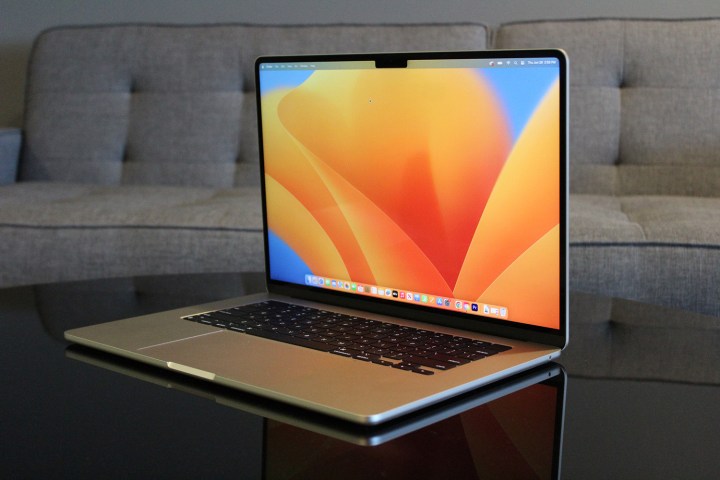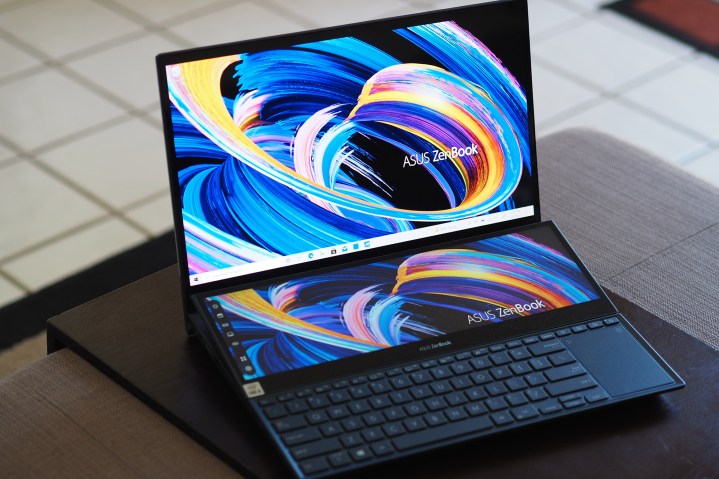While you may not be able to compete with investment banks that build their headquarters physically closer and closer to the stock exchange so they can have the fastest response time, you can at least get some fast hardware. Stock trading with an appropriate laptop is important because sometimes the difference between a big windfall and not is a few seconds, and you don’t really want your laptop lagging or slowing down when every second is valuable. As such, we’ve done our best to collect some of the best laptops for you to trade with so that you can focus on that instead of how well your laptop is keeping up.
The Best Laptops for Stock Trading
- Buy the
if you want the overall best laptop for stock trading - Buy the
if you want the best Apple laptop for stock trading - Buy the
if you want the best dual-screen laptop for stock trading - Buy the
if you need a thin and light laptop for stock trading.
Dell XPS 15
Best overall laptop for stock trading
| Pros | Cons |
| Strong productivity and creativity performance | A bit pricey |
| Good battery life | 720p webcam and Wi-Fi 6 are outdated technology |
| Excellent keyboard and touchpad |
CPU isn’t as important, especially since most stock trading apps aren’t that CPU-heavy beyond just running things smoothly. To that end, the Dell XPS 15 has an Intel Core i7-13700H, a mid-to-high-end CPU that’s more than enough to handle most stock trading apps smoothly. It’s also great for general productivity work, so if you want to use it for other more business-oriented things, it works perfectly for that too.
The only other important aspect is the screen, which is a 15.6-inch screen running a 1920×1200 resolution, which is perfectly fine for most use cases, although you can upgrade it to a 3.5k OLED version if you want something that’s easier on the eyes. If you do go for the 1920×1200 resolution, you’ll be happy to know that it can hit 500nits of peak brightness, which makes it perfect if you work in a very bright environment. Also, it has an excellent keyboard to type on, and the touchpad isn’t too bad, although you’ll likely be using an external mouse anyway.
| Specifications | |
|---|---|
| Screen Size |
15.6-inches |
| Processor | Intel Core i7-13700H |
| RAM | 32 GB DDR5 |
| Storage | 512GB SSD |
| Weight |
4.21 pounds |
Apple MacBook Air 15 (M2)
Best Apple laptop for stock trading

| Pros | Cons |
| Incredibly thin | Worryingly hot internal temperatures |
| Shockingly good performance | Only supports one monitor |
| Screen and keyboard are world-class |
If you’re an Apple user, then one of the best options to go for is the M2 MacBook Air 15. While there is the higher-end MacBook Pro 16 with a bigger screen and more RAM, that easily adds $1,000, and we don’t think it’s worth it for the extra inch and RAM. On the other hand, if you want 18GB of RAM and a bigger screen, then definitely check out the
for a higher-end experience.
On the other hand, if you want to stick with the MacBook Air 15, then you’ll be more than happy with its 16GB of RAM, which shouldn’t have an issue dealing with a bunch of different apps and windows open at the same time. Similarly, the 15-inch screen is reasonably big and is a Liquid Retina display, so it has excellent color reproduction and is great if you’re spending long hours staring at it. Also, it runs a 2880 x 1864 resolution and can hit an impressive 500 nits of peak brightness.
Of course, one of the best aspects of the MacBook Air 15 is that it’s very thin and very light; at just 0.44 inches thick, it’s easy to slip into a bag or under your arm. Also, the Touch ID sensor is great for those who are dealing with sensitive documents that require some form of authentication, which is a unique feature some other laptops don’t have. One thing we should mention, though, is that not all apps are compatible with macOS, so before spending a ton of money on the MacBook Air 15, be sure any apps you rely on work on MacOs.
| Specifications | |
|---|---|
| Screen Size |
15-inches |
| Processor | M2 Chip |
| RAM | 16 GB |
| Storage | 512 GB |
| Weight |
3.3 pounds |
Asus Zenbook Pro Duo 15
Best dual-screen laptop for stock trading

| Pros | Cons |
| Useful dual-screen design | Awkward keyboard and touchpad |
| Keyboard action is comfortable | Battery life is atrocious |
| Active pen is precise and responsive | Expensive |
It’s not often that you see a dual-screen laptop that actually works, but the Zenbook Pro Duo 15 is a pretty unique one and offers a lot of interesting opportunities for stock trading. The main screen is a 15-inch 3840 x 2160 resolution OLED display that’s easily one of the best you’re going to see, especially since it’s made for graphical work. As for the smaller screen, it’s a 14-inch 4k touchscreen that pops up at an angle so that you can draw on it or potentially put additional stock trading apps, tickers, charts, or whatever you want without needing to lug around a second screen with you.
As for performance, it has an Intel i7-12700H under the hood that will easily handle productivity and stock trading tasks without any sort of slow-down. The 16GB of DDR5 RAM should also be more than enough for most applications, although it’s always worth double-checking if you feel you need more. You might also be interested to know that it comes with an RTX 3070 Ti GPU, and while it won’t really be useful for stock trading, it does mean you can do some gaming if you want a laptop that can also do that.
Of course, we do want to point out that there are some downsides to having a laptop that’s so unique. For one, the fact that the smaller screen takes up a lot of the usual place for a keyboard means that both it and the touchpad are cramped, so be sure to consider that. Also, trying to run two screens eats up battery life, especially if you also want to do some gaming, so be aware that you’re not going to be able to run this for more than five hours or so, and that’s in the best-case scenario. Even so, it’s a very unique laptop and well worth considering if you feel you need the extra screen.
| Specifications | |
|---|---|
| Screen Size |
15-inches & 14-inches |
| Processor | Intel i7-12700H |
| RAM | 36GB |
| Storage | 1TB |
| Weight |
4.8 pounds |
LG gram 17
Best thin and portable laptop for stock trading

| Pros | Cons |
| Exceptionally light | Feels a little flimsy |
| Excellent display | Expensive |
| Very good keyboard and touchpad | Only has an RTX 4050 |
For some folks, portability is one of the most important things, and the LG Gram 17 can certainly deliver that. At just 0.7 inches in thickness, it comes pretty close to the MacBook Air in terms of thickness, which is pretty impressive for something that has these specs and a GPU under the hood. Admittedly, the RTX 3050 is an entry-level card that will only allow for some light gaming, but having it there certainly adds versatility, especially if you also need to do things like graphical and photo editing. It will also make it easier to support a second screen for you to work with, especially if it runs at a higher resolution.
It’s also quite light at 3.2 pounds, so it’s also quite easy to carry around, assuming that the massive 17-inch screen and larger size don’t bother you. It runs a WQXGA resolution and gives you a lot of space for apps, charts, browser pages, and really anything you can think of. And while it’s not quite the same as just having a large 24-inch or 27-inch screen, it’s as close as you’re going to get on something this portable. That said, one downside of such a light and big laptop is that it does feel a bit flimsy and flexible, so be sure to be careful with it when using it.
As for processing power, it runs an Intel Core i7 Evo, the same sort of mid-to-high-end CPU that we’ve seen so far, and is perfect for most stock-trading tasks. On the other hand, you’ll be happy to know that this configuration of the LG Gram 17 comes with an impressive 32GB of RAM, so it should be more than enough to have as many things open as your heart desires. Finally, the 2TB of storage probably won’t be a big deal since most stock trading stuff is handled online, but it’s still a nice little addition to have, especially to store shows, films, music, or even games.
| Specifications | |
|---|---|
| Screen Size |
17-inches |
| Processor | Intel Core i7 Evo |
| RAM | 32 GB DDR5 |
| Storage | 2 TB |
| Weight |
3.2 pounds |
How We Chose These Laptops for Stock Trading
CPU & RAM
Both the CPU and RAM are important when it comes to stock trading for related reasons. When it comes to CPU, you need something that can handle your stock trading apps without having things lag or slow down, especially when each second counts. You really just want something that works, but at the same time, there’s no point spending for a high-end CPU that’s not going to give you very small and diminishing returns, which is why like the mid-to-high-end Intel i7 and Ryzen R7 CPUs for this. Most of the options above have an Intel i7 under the hood except for the Apple option, which runs an equivalent M2 Chip.
As for RAM, stock trading often requires you to have a lot of apps and browser tabs, which are notorious for eating up RAM. To that end, having a solid amount of RAM is important, and for that, the ideal minimum is 16GB, with 32 GB being even better, although not necessary. We’ve provided a couple of options for each, with the Apple pick having a higher-end and more expensive option that has a ton more RAM for you.
Screen
If you have so many tabs and apps open, you might as well see them, and since needing to keep track of several bits of information is important, the more screen space you have, the better. That means anything under 15 inches will probably be a bit too small to deal with. To that end, none of our picks dip below that, and we’ve included at least one pick with 17 inches so that if you feel you need more screen space, you can get it that way.
GPU
GPUs don’t actually help at all in stock trading, which will not be good news for stock traders who also like to game. On the other hand, they do help with running a second screen, especially if it’s running a higher resolution like 2k or 4k, which the integrated or on-board GPUs might not be able to handle. So, if you like to use one or more additional displays, opting for a laptop with a graphics card will help a lot.
Battery Life
This one can go either way; for some stock traders, they’re always in an office space or somewhere near an outlet, and for others, they move around a lot. The problem is that having a good battery life always comes with compromises, such as worse specs, smaller screens, and things of that nature. As such, it’s good to have a firm understanding of your usage and how much battery life you actually need vs what you can get in return for opting for a worse battery.
This article is managed and created separately from the Digital Trends Editorial team.
Editors’ Recommendations







